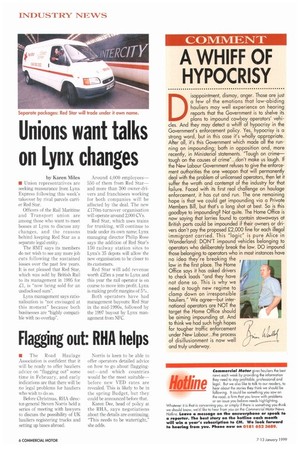Unions want talks on Lynx changes
Page 8

If you've noticed an error in this article please click here to report it so we can fix it.
by Karen Miles • Union representatives are seeking reassurance from Lynx Express following this week's takeover by rival parcels carrier Red Star.
Officers of the Rail Maritime and Transport union are among those who want to meet bosses at Lynx to discuss any changes, and the reasons behind keeping Red Star as a separate legal entity.
The RMT says its members do not wish to see any more job cuts following the sustained losses over the past few years. It is not pleased that Red Star, which was sold by British Rail to its management in 1995 for £1, is "now being sold for an undisclosed sum".
Lynx management says rationalisation is "not envisaged at this moment" because both businesses are "highly compatible with no overlap". Around 4,000 employees550 of them from Red Star— and more than 300 owner-drivers and franchisees working for both companies will be affected by the deal. The new 1:170m-turnover organisation will operate around 2,000 CVs.
Red Star, which uses trains for trunking, will continue to trade under its own name; Lynx managing director Philip Rose says the addition of Red Star's 150 railway station sites to Lynx's 35 depots will allow the new organisation to be closer to its customers.
Red Star will add revenue worth £25m a year to Lynx and this year the rail operator is on course to move into profit. Lynx is making profit margins of 5%.
Both operators have had management buyouts: Red Star in the mid-1990s, followed by the 1997 buyout by Lynx management from NFC.
































































































